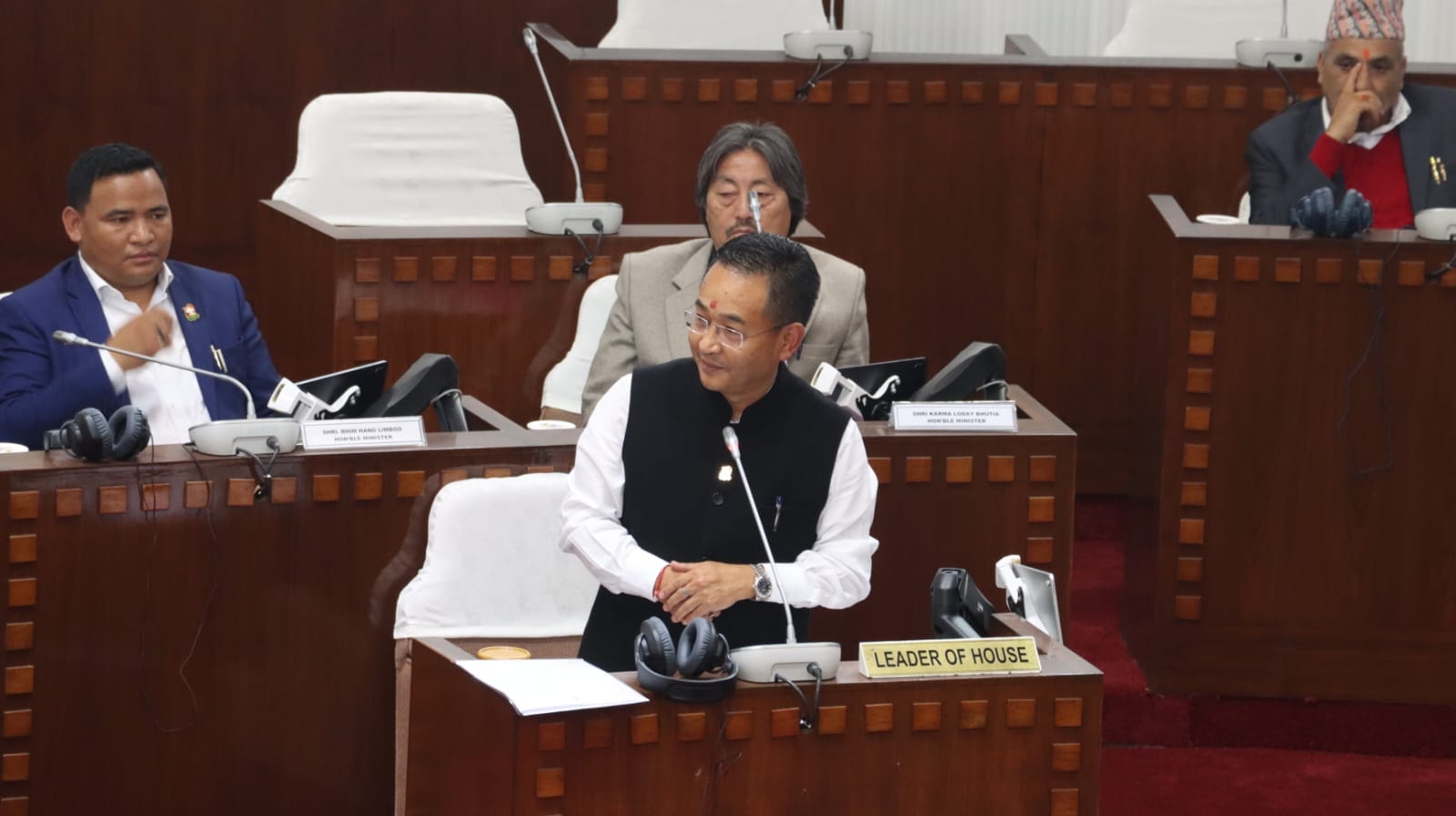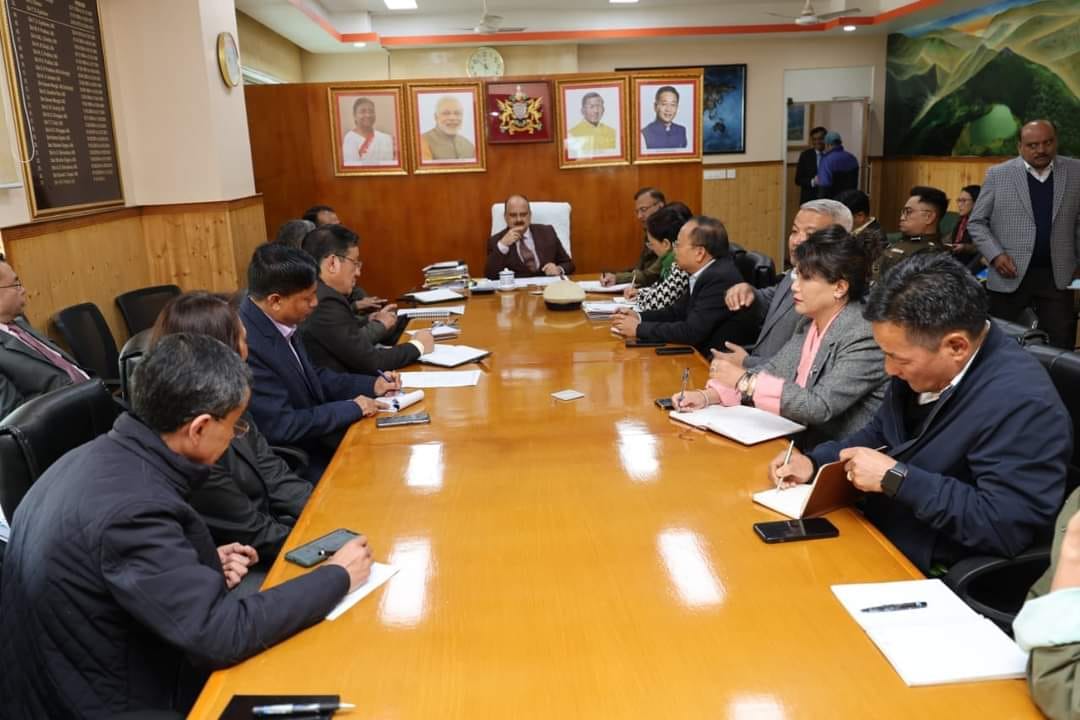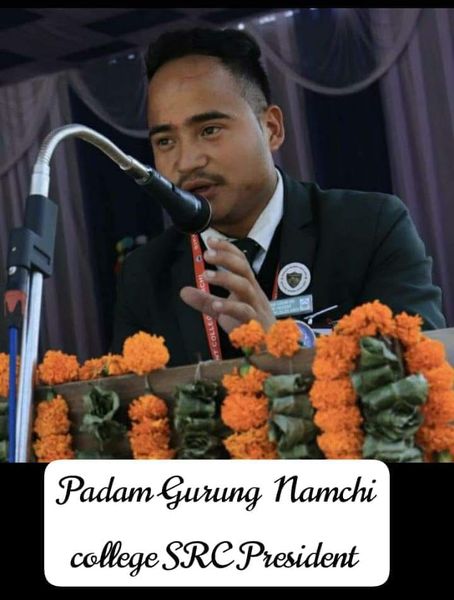
Gangtok, April 10 (IPR): Sikkim Legislative Assembly held a special session today and passed the Government Resolution No. 2 of 2023, “Clarification of clause (iv) and clause (v) of section 10 (26AAA) of the Income Tax Act, 1961 as inserted by Finance Act, 2023 (No. 8 of 2023)“.
The resolution was proposed by Minister for Law and Parliamentary Affairs Department, Shri Kunga Nima Lepcha, and was seconded by Minister for Building & Housing, Social Welfare and Women & Child Development Departments, Shri Sanjeet Kharel during the Sixth Session (Part VII) of the Tenth Assembly of the Sikkim Legislative Assembly.
The special session had been called on to address the rising ambiguity among the masses concerning the expansion of the Sikkimese term as per the amendments made to the Union Finance Bill 2023, passed by Lok Sabha on March 26.

Proposing the Government Resolution No. 2 of 2023 in the House, Law and Parliamentary Affairs Minister, Shri K.N. Lepcha, said that according to the judgement of the Hon’ble Supreme Court, Ministry of Finance, Government of India introduced and passed the Finance Act, 2023 (No. 8 of 2023), making amendments that included two new categories in the definition of “Sikkimese” under Section 10 of 26AAA of the Finance Act.
The clauses that have been inserted are:
iv) any other individual whose name does not appear in the Register of Sikkim Subjects but it is established that such individual was domiciled in Sikkim on or before the 26th day of April 1975; or
v) any other individual, who was not domiciled in Sikkim on or before the 26th day of April 1975, but it is established beyond doubt that such individual’s father or husband or paternal grand-father or brother from the same father was domiciled in Sikkim on or before the 26th day of April 1975.
However, the Minister added that these two categories of individuals do not fall under the definition of ‘Sikkimese’ as mentioned in the Government of Sikkim Act, 1974.
The Law and Parliamentary Affairs Minister stated that the introduction and passing of Finance Act, 2023 (No. 8 of 2023), making the recent amendment in section 10 (26AAA), has “deeply hurt the feeling and sentiments of the people of Sikkim and has created apprehension in the minds of the people of Sikkim that the definition of the term ‘Sikkimese’ has been diluted.”
As the insertion of clauses (iv) and (v) to the explanation under sub-section 26AAA of Section 10 of Income Tax Act, 1961 has clubbed the three ethnic groups of Sikkim at par with the others, the Government of Sikkim has deemed it necessary for the Government Resolution No. 2 of 2023 to be adopted and passed in the State Legislative Assembly to “clearly establish beyond any doubt that the term ‘Sikkimese’ shall mean the three ethnic communities of the State, i.e., Lepcha of Sikkimese origin, Bhutia of Sikkimese origin and Nepali of Sikkimese origin only.”
The Law and Parliamentary Affairs Minister sought for support of all the Members for consideration, adoption and passing of the following resolutions:-
(i) Apprise the above issues to the Government of India;
(ii) Request Govt. of India to consider the issue and extend all possible help and support, as always, to protect the distinct identity of the Sikkimese people in terms of 8th May 1973 Agreement and Article 371F of the Constitution and to ensure that the distinct identity and protection guaranteed to the Sikkimese people is not diluted;
(iii) Request Government of India to acknowledge and maintain that the special status and distinct identity/classification granted to the Sikkimese people are the political commitments and assurances given to the people of Sikkim at the time of the merger and the definition of “Sikkimese” shall not be diluted and the sentiments of the people of Sikkim is not hurt;
(iv) Request Government of India not to include persons mentioned in clause (iv) and (v) of sub-section 26AAA of section 10 of the Income Tax Act, 1961 in the definition of “Sikkimese” and issue necessary clarification in the form of a notification giving separate category to the individuals or persons as mentioned in clauses (iv) and (v) of sub-section 26AAA of section 10 of the Income Tax Act, 1961 and put them in “Others category” in the above said Act for the purpose of income tax exemption only and maintain the exclusivity of the terms “Sikkimese”;
(v) Further, request Government of India to make necessary amendments in the Income Tax Act for putting individuals or persons as mentioned in clauses (iv) and (v) of sub-section 26AAA of section 10 of the Income Tax Act, 1961 in “Others category” in the above said Act for the purpose of income tax exemption thereby segregating the individuals and persons mentioned in clauses (iv) and (v) above from three ethnic community of Sikkim.
The Law and Parliamentary Minister further asserted that Article 371F is a treaty that cannot be challenged.
This was followed by a discussion on the resolution that witnessed suggestions and deliberations placed forth in the House by MLAs Shri D.R. Thapa, Shri N.K. Subba, Shri Pawan Kumar Chamling, Shri Sonam T. Venchungpa, Shri T.T . Bhutia, Shri Sanjeet Kharel, Shri Pintso Namgyal Lepcha, Shri Sonam Lama, and Smt. Raj Kumari Thapa.
Clarifying on issues raised by the MLAs over the expansion of the “Sikkimese” term in the recent amendments of the Finance Act, Chief Minister Shri Prem Singh Tamang, also the Leader of the House, said that the amendments do not attack the sanctity of Article 371F which safeguards the rights of the Sikkimese people.
The essence of Article 371F has remained intact, and he added that the Union Finance Minister herself assured this during his recent visit to the Union FM’s office in New Delhi.
The Chief Minister reiterated that the Union Finance Minister herself has assured the people of Sikkim that the definition of Sikkimese Lepcha, Sikkimese Bhutia, and Sikkimese Nepali will always be respected and that it has neither been touched nor will it ever be touched or changed.
Assurances have also been extended from the President of India to the Solicitor General of India that the amendments to the Finance Bill will not impinge on the definition of “Sikkimese,” he stated.
The Chief Minister informed that the amendments have been made in pursuance of the judgement of the Supreme Court of India and added that it encompasses the purpose of income tax only, keeping the sanctity of Article 371F intact.
He further cited a few examples of previous cases pertaining to Sikkimese identity wherein the verdicts pronounced by the Supreme Court have honoured the respectful entitlement of Sikkimese identity that the special constitutional provisions under Article 371F have always protected.
He further suggested setting up an all-party committee consisting of a delegation of every political party of the State to ensure the conservation of Article 371F and the safety of the Sikkimese people as a whole.
The house was adjourned amid an intense altercation for ten minutes, after which the session resumed again. During the clarification regarding certain income tax notifications given by the Leader of the House, Shree Prem Singh Tamang, MLA Shri Pawan Kumar Chamling interjected, causing a brief disturbance by interrupting the continuity of the speech.
In response, the Speaker of the House, Shri Arun Kumar Upreti, requested the members to maintain the decorum and sanctity of the House. However, any amicable situation could not be restored. Therefore, to bring order to the House, the Speaker marshalled out the lone MLA from Sikkim Democratic Front, Shri Pawan Kumar Chamling, for breaching the decorum and disrupting the speech of the Leader of the House.
After proper order was maintained in the House and the Government Resolution No. 2 of 2023 was put to the vote, the Chair declared the resolution to be adopted and passed.
In his valedictory remarks, Speaker Shri Arun Kumar Upreti thanked all the members of the House for assisting in the smooth proceeding of the Sixth Session (Part VII) of the Tenth Assembly of Sikkim Legislative Assembly.
Likewise, Leader of the House, Shri Prem Singh Tamang, assured that the State government is committed to protecting the interest of the entire Sikkimese people and the State of Sikkim. He further thanked the Speaker, Deputy Speaker, Cabinet Ministers, MLAs, Chief Secretary, DGP, ACSs, Secretaries, media personnel, and other officials for their respective roles in successfully conducting the session.
The House was adjourned Sine Die.
For breaking news and live news updates, like us on Facebook fb.com/thevoiceofsikkim or follow us on Twitter twitter.com/thevoicesikkim and Instagram instagram.com/thevoiceofsikkim. Visit www.voiceofsikkim.com.






